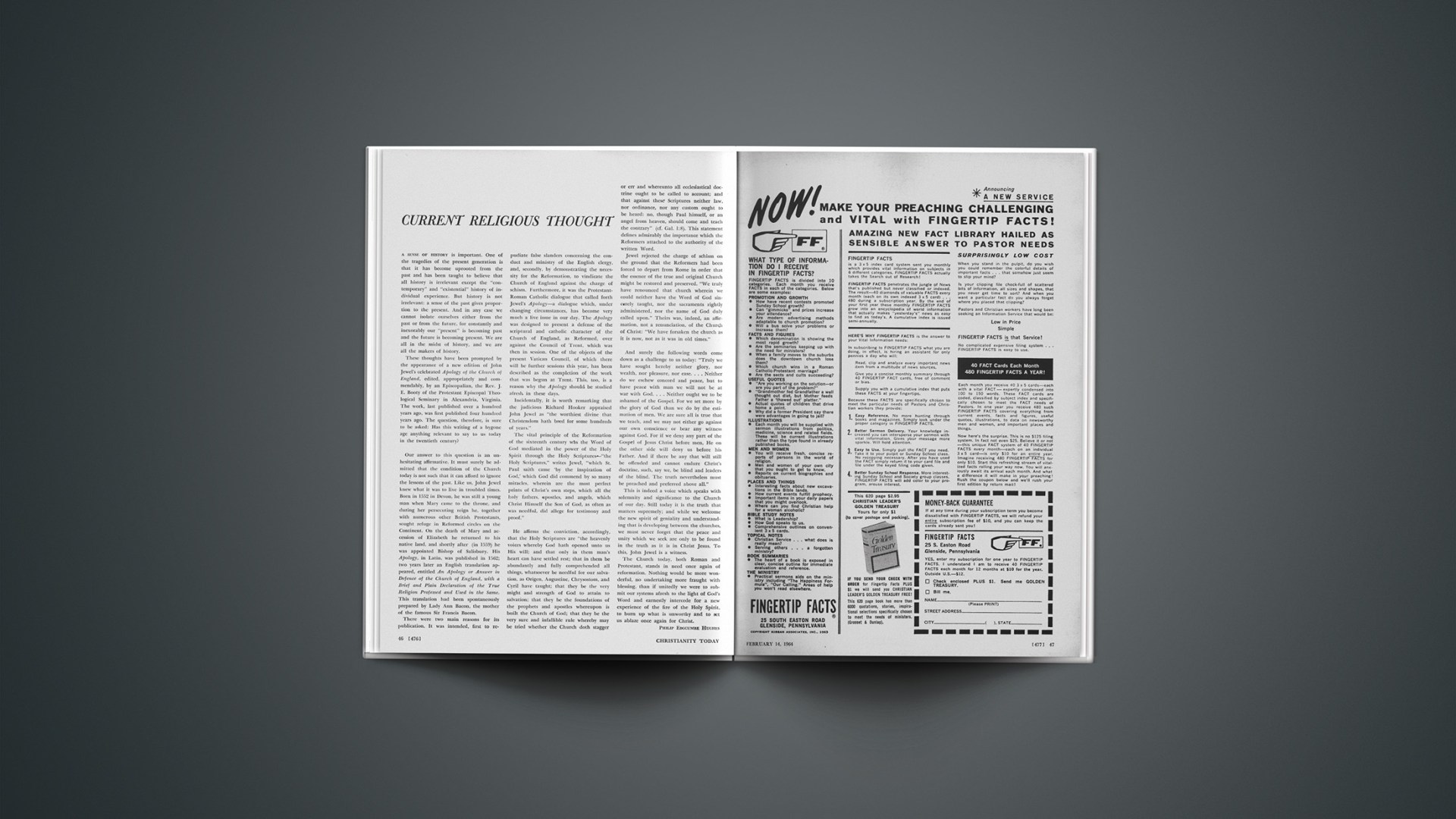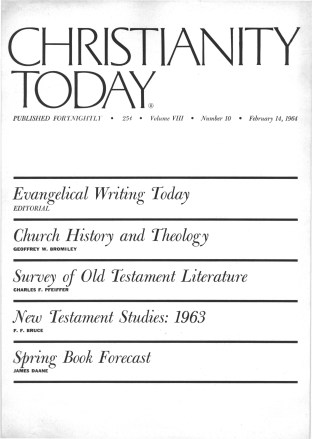A sense of history is important. One of the tragedies of the present generation is that it has become uprooted from the past and has been taught to believe that all history is irrelevant except the “contemporary” and “existential” history of individual experience. But history is not irrelevant: a sense of the past gives proportion to the present. And in any case we cannot isolate ourselves either from the past or from the future, for constantly and inexorably our “present” is becoming past and the future is becoming present. We are all in the midst of history, and we are all the makers of history.
These thoughts have been prompted by the appearance of a new edition of John Jewel’s celebrated Apology of the Church of England, edited, appropriately and commendably, by an Episcopalian, the Rev. J. E. Booty of the Protestant Episcopal Theological Seminary in Alexandria, Virginia. The work, last published over a hundred years ago, was first published four hundred years ago. The question, therefore, is sure to be asked: Has this writing of a bygone age anything relevant to say to us today in the twentieth century?
Our answer to this question is an unhesitating affirmative. It must surely be admitted that the condition of the Church today is not such that it can afford to ignore the lessons of the past. Like us, John Jewel knew what it was to live in troubled times. Born in 1552 in Devon, he was still a young man when Mary came to the throne, and during her persecuting reign he, together with numerous other British Protestants, sought refuge in Reformed circles on the Continent. On the death of Mary and accession of Elizabeth he returned to his native land, and shortly after (in 1559) he was appointed Bishop of Salisbury. His Apology, in Latin, was published in 1562; two years later an English translation appeared, entitled An Apology or Answer in Defence of the Church of England, with a Brief and Plain Declaration of the True Religion Professed and Used in the Same. This translation had been spontaneously prepared by Lady Ann Bacon, the mother of the famous Sir Francis Bacon.
There were two main reasons for its publication. It was intended, first to repudiate false slanders concerning the conduct and ministry of the English clergy, and, secondly, by demonstrating the necessity for the Reformation, to vindicate the Church of England against the charge of schism. Furthermore, it was the Protestant-Roman Catholic dialogue that called forth Jewel’s Apology—a dialogue which, under changing circumstances, has become very much a live issue in our day. The Apology was designed to present a defense of the scriptural and catholic character of the Church of England, as Reformed, over against the Council of Trent, which was then in session. One of the objects of the present Vatican Council, of which there will be further sessions this year, has been described as the completion of the work that was begun at Trent. This, too, is a reason why the Apology should be studied afresh in these days.
Incidentally, it is worth remarking that the judicious Richard Hooker appraised John Jewel as “the worthiest divine that Christendom hath bred for some hundreds of years.”
The vital principle of the Reformation of the sixteenth century was the Word of God mediated in the power of the Holy Spirit through the Holy Scriptures—“the Holy Scriptures,” writes Jewel, “which St. Paul saith came ‘by the inspiration of God,’ which God did commend by so many miracles, wherein are the most perfect prints of Christ’s own steps, which all the holy fathers, apostles, and angels, which Christ Himself the Son of God, as often as was needful, did allege for testimony and proof.”
He affirms the conviction, accordingly, that the Holy Scriptures are “the heavenly voices whereby God hath opened unto us His will; and that only in them man’s heart can have settled rest; that in them be abundantly and fully comprehended all things, whatsoever be needful for our salvation, as Origen, Augustine, Chrysostom, and Cyril have taught; that they be the very might and strength of God to attain to salvation; that they be the foundations of the prophets and apostles whereupon is built the Church of God; that they be the very sure and infallible rule whereby may be tried whether the Church doth stagger or err and whereunto all ecclesiastical doctrine ought to be called to account; and that against these Scriptures neither law, nor ordinance, nor any custom ought to be heard: no, though Paul himself, or an angel from heaven, should come and teach the contrary” (cf. Gal. 1:8). This statement defines admirably the importance which the Reformers attached to the authority of the written Word.
Jewel rejected the charge of schism on the ground that the Reformers had been forced to depart from Rome in order that the essence of the true and original Church might be restored and preserved. “We truly have renounced that church wherein we could neither have the Word of God sincerely taught, nor the sacraments rightly administered, nor the name of God duly called upon.” Theirs was, indeed, an affirmation, not a renunciation, of the Church of Christ: “We have forsaken the church as it is now, not as it was in old times.”
And surely the following words come down as a challenge to us today: “Truly we have sought hereby neither glory, nor wealth, nor pleasure, nor ease.… Neither do we eschew concord and peace, but to have peace with man we will not be at war with God.… Neither ought we to be ashamed of the Gospel. For we set more by the glory of God than we do by the estimation of men. We are sure all is true that we teach, and we may not either go against our own conscience or bear any witness against God. For if we deny any part of the Gospel of Jesus Christ before men, He on the other side will deny us before his Father. And if there be any that will still be offended and cannot endure Christ’s doctrine, such, say we, be blind and leaders of the blind. The truth nevertheless must be preached and preferred above all.”
This is indeed a voice which speaks with solemnity and significance to the Church of our day. Still today it is the truth that matters supremely; and while we welcome the new spirit of geniality and understanding that is developing between the churches, we must never forget that the peace and unity which we seek are only to be found in the truth as it is in Christ Jesus. To this, John Jewel is a witness.
The Church today, both Roman and Protestant, stands in need once again of reformation. Nothing would be more wonderful, no undertaking more fraught with blessing, than if unitedly we were to submit our systems afresh to the light of God’s Word and earnestly intercede for a new experience of the fire of the Holy Spirit, to burn up what is unworthy and to set us ablaze once again for Christ.










